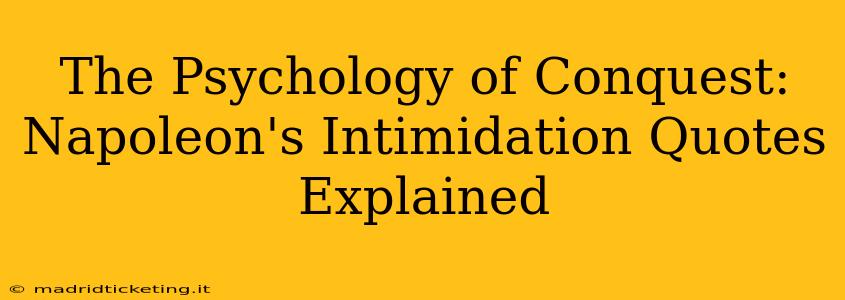Napoleon Bonaparte. The name alone evokes images of sweeping military victories, audacious ambition, and a strategic mind that reshaped Europe. But beyond the battlefield prowess lay a master manipulator, a skilled psychologist who used words as weapons. His intimidation tactics, often delivered through chillingly memorable quotes, reveal a fascinating insight into the psychology of conquest. This article delves into some of Napoleon's most potent quotes, analyzing their psychological impact and the strategies behind their effectiveness. We'll explore how he used language to demoralize opponents, inspire his troops, and ultimately, achieve his ambitious goals.
Napoleon's Use of Intimidation: A Strategic Weapon
Napoleon understood the power of psychological warfare. He wasn't just a military genius; he was a master of manipulation, using carefully chosen words to project an image of invincibility, shattering the morale of his enemies before a single shot was fired. His quotes weren't merely pronouncements; they were meticulously crafted psychological weapons designed to sow doubt, fear, and ultimately, surrender.
"A leader is a dealer in hope."
This seemingly benign quote reveals a crucial aspect of Napoleon's leadership. He understood that hope, or the lack thereof, is a potent psychological force. By inspiring unwavering hope in his own troops and simultaneously fostering despair in his enemies, he created a significant psychological advantage on the battlefield. This quote highlights his awareness of the motivational power of belief and the debilitating impact of hopelessness.
What were Napoleon's primary psychological tactics?
Napoleon employed a multi-faceted approach to psychological warfare, combining intimidation with inspirational leadership. He mastered the art of:
- Projecting an image of invincibility: His confident demeanor and bold pronouncements fostered a belief in his unassailable power.
- Exploiting enemy weaknesses: He astutely identified and amplified the vulnerabilities of his opponents, sowing seeds of doubt and fear.
- Maintaining unwavering self-belief: His unwavering conviction in his own abilities instilled confidence in his troops and eroded the resolve of his enemies.
- Using propaganda effectively: He expertly manipulated information to control the narrative and influence public perception.
"Impossible is a word to be found only in the dictionary of fools."
This quote speaks volumes about Napoleon's relentless ambition and his ability to inspire unwavering determination in his troops. By dismissing the concept of "impossible," he instilled a belief in the seemingly unattainable, fostering a sense of unwavering courage and resolve. This is a powerful motivational technique, pushing his soldiers beyond their perceived limits.
How did Napoleon's quotes affect his enemies?
Napoleon's intimidating quotes served to demoralize opponents. The sheer audacity and confidence projected through his words could be crippling. His pronouncements created an atmosphere of fear and uncertainty, weakening the resolve of enemy forces before even engaging in battle. This psychological warfare often proved as effective, if not more so, than any military strategy.
"There are but two powers in the world, the sword and the mind. In the long run the sword is always beaten by the mind."
This quote demonstrates Napoleon's understanding of the importance of strategic thinking and psychological warfare. While he certainly relied on military might, he recognized that the mind – the ability to outmaneuver, outthink, and demoralize the opponent – was ultimately the more powerful weapon. This strategy extended beyond the battlefield, influencing his political maneuvering and his control over power.
Did Napoleon's intimidation tactics always work?
While largely successful, Napoleon's intimidation tactics weren't foolproof. His overconfidence and unwavering belief in his own invincibility ultimately contributed to his downfall. The relentless pursuit of power, fueled by his psychological manipulation, led to overextension and ultimately defeat. This highlights the importance of balance; while psychological warfare can be a powerful tool, it should be used strategically and with awareness of its limitations.
Conclusion: The Legacy of Napoleon's Psychological Warfare
Napoleon's legacy extends far beyond his military conquests. His mastery of psychological warfare, evident in his intimidating quotes and manipulative strategies, offers a fascinating case study in the power of language and the human psyche. His ability to use words as weapons serves as a reminder of the profound psychological impact of leadership and the importance of understanding the power dynamics of intimidation and inspiration. Studying his techniques provides valuable insight into the strategies of effective leadership and the enduring power of psychological warfare.

